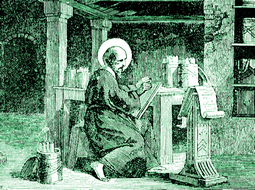Lives of the Saints
Our Models and Protectors
Spiritual Bouquet:
June 1st

Saint Pamphilus
Martyr
(† 308)
Saint Pamphilus, a scholar and martyr of the early fourth century, born of a rich and honorable family, was a native of Berytus in Phenicia. That city was famous then for its schools, and Pamphilus in his youth pursued studies in all the existing branches of learning; afterwards he went to the renowned Christian school of Alexandria, where he had as master a celebrated Christian philosopher named Pierius. Then he journeyed to Caesarea in Palestine, and was there ordained a priest.
After he began to know Christ, he could relish no pursuit but that of the doctrine of salvation, and he renounced all other occupations to apply himself wholly to the study of Holy Scripture and the practices of virtue. At his own expense, he collected a great library of thirty thousand volumes and bestowed it on the church of Caesarea. The Saint also established there a school of sacred literature open to the public, and to his labors the Church was indebted for a corrected edition of the Holy Bible. This, with infinite care, he transcribed himself.
Nothing was more remarkable in Saint Pamphilus than his extraordinary humility. He distributed his paternal estate among the poor; his behavior towards his servants was always that of a brother or a tender father. He led a very austere life, sequestered from the world and its company, and was indefatigable in his scholarly labors. This virtue was his apprenticeship for the grace of martyrdom.
He was giving public lessons in the city of Caesarea, when the persecution of Maximius Daius interrupted them. In the year 307, Urbanus, the cruel governor of Palestine, had him arrested, and after trying unsuccessfully to win this important personage by promises and flattery, commanded him to be inhumanly tormented. But the iron hooks which tore the holy priest's sides served only to cover the judge with confusion, for no means could alter his holy convictions. The governor had Saint Pamphilus transported half-dead to a prison, where he remained virtually forgotten for two years, his cruel persecutor himself having been reproved and executed by orders of the Emperor, and another having replaced him.
Finally, with nine other imprisoned Christians, Saint Pamphilus was sentenced to death without burial. But no wild creatures approached the bodies of Saint Pamphilus and the other martyrs who died on the same evening. Their guards were impressed, and finally the faithful were allowed to carry away the blessed martyrs for honorable burial.
Reflection. A multitude of witnesses, a noble army of martyrs, teach us by their constancy to suffer wrongs with patience, and strenuously to resist evil. The daily trials we meet with from others or ourselves are always permitted by God, who sometimes purposely poses difficulties before us in order to reward our victory, and like a wise physician, restores us to health by bitter potions.
Little Pictorial Lives of the Saints, a compilation based on Butler's Lives of the Saints, and other sources by John Gilmary Shea (Benziger Brothers: New York, 1894); Les Petits Bollandistes: Vies des Saints, by Msgr. Paul Guérin (Bloud et Barral: Paris, 1882), Vol. 5